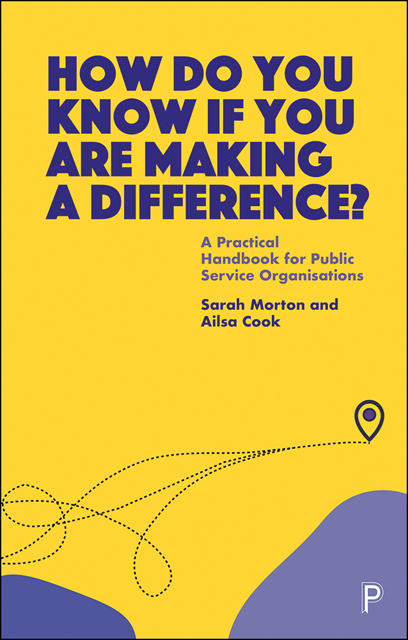 How Do You Know If You Are Making a Difference?
How Do You Know If You Are Making a Difference? Book contents
- Frontmatter
- Dedication
- Contents
- List of figures and tables
- Acknowledgements
- Preface
- 1 Why is it so hard to know if you are making a difference?
- 2 Why complexity thinking can help you understand public services
- 3 What data and evidence do you need to see what difference you are making?
- 4 Embrace the complex contex
- 5 Embrace the complex context
- 6 Clarify the change you want to see
- 7 Get going on your data, evidence and feedback improvement journey
- 8 Tracking progress towards outcomes and impacts
- 9 Telling the story of the difference your work makes
- 10 Using this approach in different contexts and sectors
- 11 Becoming an outcome- and impact-focused organisation
- References
- Index
Preface
Published online by Cambridge University Press: 20 June 2023
- Frontmatter
- Dedication
- Contents
- List of figures and tables
- Acknowledgements
- Preface
- 1 Why is it so hard to know if you are making a difference?
- 2 Why complexity thinking can help you understand public services
- 3 What data and evidence do you need to see what difference you are making?
- 4 Embrace the complex contex
- 5 Embrace the complex context
- 6 Clarify the change you want to see
- 7 Get going on your data, evidence and feedback improvement journey
- 8 Tracking progress towards outcomes and impacts
- 9 Telling the story of the difference your work makes
- 10 Using this approach in different contexts and sectors
- 11 Becoming an outcome- and impact-focused organisation
- References
- Index
Summary
Thank you for picking up this book. We want to set the scene in this preface by explaining why we wanted to write it; that is, how we met, what we both brought with us and how that was developed through working together on one of our early projects. We have used a fictionalised version of the project we introduce here throughout the rest of the book as an example. It explains why it’s often hard to demonstrate impact.
It started when we met through our connections with the University of Edinburgh. Ailsa had been working in the personal outcomes space, leading a master’s programme for health and social care managers and a programme of action research exploring meaningful and measurable outcome recording and assessment. Sarah was working in the research and evidence to action space, working with organisations to use research and evidence to drive change, and developing understanding through research and practical projects about what evidence use looks like in the real world. What we shared was a commitment to using our skills to make a difference to the problems we saw organisations facing, and to bringing robust academic thinking to very practical issues. We have come to consider ourselves practical academics – pracademics!
In particular, Ailsa was acutely aware that organisations in health and social care were troubled by the issues of meaningfully assessing outcomes, and Sarah had been experimenting with contribution analysis as a way of understanding research impact and wider change processes. Once we started talking about bringing these two issues together, and trying it out with some of our projects, we could really see the potential. We started working together in 2014 and set up our company, Matter of Focus, in 2017 as a vehicle to develop the approach, bring it to more people and create tools to make it genuinely practical for organisations to use. We want to tell you about one of our early projects together as a way of illustrating the issues that we help teams to face.
In the first year of our company, we worked with a local wellbeing service that assisted people through a personal outcomes approach – defining with people what was important to them and encouraging them towards their own goals.
- Type
- Chapter
- Information
- How Do You Know If You Are Making a Difference?A Practical Handbook for Public Service Organisations, pp. ix - xivPublisher: Bristol University PressPrint publication year: 2022
